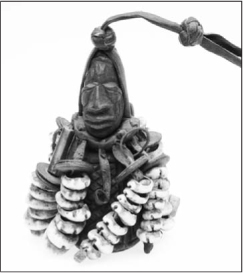African MythologiesLegba and Ananse |
What is the story of Legba? |
Legba (Elegba, Eshu) came into being at the very beginning of creation when the creator still lived on earth.
One myth tells us that he was, in fact, the son of the creator and the facilitator of the creator’s will among his human subjects, filling a kind of culture-hero role while the creator remained aloof. If the creator caused bad things to happen, Legba was blamed, and if good things happened, the creator was praised. The situation so irritated Legba that he confronted his father. “I have only done what you have asked me to do,” he said, “and it only gets me into trouble, since I get blamed when you cause bad things to happen.” The creator replied that kings should always be praised for good things and his servants should be blamed for bad ones: “That’s just the way it is and always will be,” he said. This conversation infuriated Legba further and he plotted a trick of revenge. Lying, he claimed to his father that he had heard rumors that thieves were planning to steal from his famous garden of fine yams. Furious, the creator proclaimed that anyone who stole his yams would be executed. That night Legba stole into his father’s house and took the god’s sandals. After putting them on, he made his way into the garden and took all the yams. The next morning he ran to the creator’s house and announced that all the yams had been stolen, but pointed out that since the thief had left sandal prints it should be easy enough to find him. The creator called everyone together to see whose sandal prints had been left in the garden. But the prints were huge—much larger than any feet in the village. So Legba turned to his father and said, “Sir, do you think it’s possible that you took the yams while sleep-walking?” “Of course not,” cried the god, but when he put his feet into the prints there was a perfect match. Now the people began to grumble about the creator stealing from himself. The creator realized that his crafty son had tricked him, and in fury he left the world for the sky, leaving his son in charge on earth.

This wooden figure with coins, cowry shells, and cords is a symbol of Eshu (Legba).
